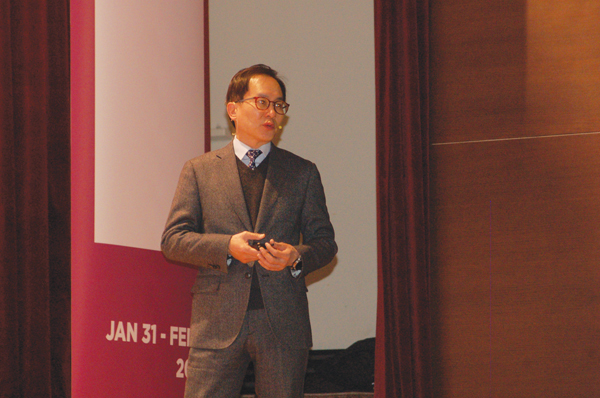

Data-Driven Apps Offer Opportunities, Hurdle Challenges
T
he global semiconductor chip market is confronting new, unparalleled market opportunities and challenges. The rapid penetration of data-hungry applications like artificial intelligence (AI), big data analytics, augmented reality or virtual reality, Internet of Things (IoT), and block chain technology across a broad range of devices is fueling demand for everything from memory chip, neural processing units (NPUs), central processing units, sensors to network processors. Especially, the growing adoption of AI and block chain technology across edge devices as well as cloud computing networking presages a new data-driven growth era for semiconductor chip makers.

Photo 1: Ho-Kyu Kang, Executive Vice President with Samsung Electronics Co., Ltd.
On the technology side, however, untapped technology requirements are rapidly shaping up, pressing chip makers to innovate on materials and chip structures to keep up with the burst of the demand boom.
Specifically, the ramp up to 10nm and below circuitry technology enables chip makers to get more chips out of silicon wafer, allowing them to further shrink chip sizes. However, this process unavoidably creates side effects, taking a heavy toll on yield, as it leads to a string of undetectable microscopic impurity particles, of which sizes are as half as that of 10nm and below circuitry patterns. As they are nanometer-level microscopic, they cannot be detected and tracked even with today's most sophisticated optical light-source-based inspection equipment, resulting in severe deteriorations in yield. That low yield translates into rises in unit production costs per chip.
Equally challenging are the stringent system requirements for fast data processing, as video and audio-heavy data-hungry applications, like AI and block chain are catching on. This situation forces chip makers to look elsewhere to find a new breed of phase changing memory (PCM) and magnetic RAM chip as well as NPUs.
During the opening keynote speech at SEMICON Korea 2018 held on Jan. 31, HK Kang (Kang Ho-Kyu), Executive Vice President and Head of Research at Semiconductor R&D center at Samsung Electronics, said, "The global chip industry is now riding a fourth wave of data-driven growth momentum, as rapid penetration of AI, or artificial intelligence, is further sophisticating Big Data Analytics technology, enabling people to dig and mine more data to make the best use of them. As various data like images and audio are being mined through a growing number of sensors-embedded smartphones and other mobile devices, the 20 year-old AI algorithm finally comes back to life, promising to dig into more data."
According to him, data has been exponentially mined across a vast network of sensor grid. In 2017 alone, 30 zeta bytes of data were mined. Over the next 7 years, data in use will jump seven times to hit 210 zeta bytes (1 zeta amounts to 1 billion 1TB SSDs).
AI's revival can potentially create new demand for semiconductor chips. As AI emulates the way human brain work, it needs sensory network like image-and voice-recognition sensors to gather data. Moreover, there must be a memory chip to store them and a CPU to process them.

 English
English Japanese
Japanese